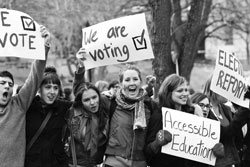As the 2016 presidential election draws near, candidates are eagerly doing their best to ensure that they get every vote they can. They argue with each other in debates, they release interviews where they discuss their future plans and policies, and they do their best to make the American public believe that they are the best one for the job, that they are the one that should be chosen.
The Bipartisan Policy Center released a report shortly after the 2012 Presidential Election, stating, “Despite an increase of over eight million citizens in the eligible population, turnout declined from 131 million voters in 2008 to an estimated 126 million voters in 2012.” This means that about 93 million eligible citizens did not vote in the last election.
In 1972, those who were 18 were given the right to vote. While the current generation of young people is believed to be politically and socially aware, they do not show it the way that their parents and grandparents did; they are much less likely to donate their time or money to a campaign, and come voting day, they are less likely to be seen at the booths.
“It’s important for anybody to vote,” said Dr. Stephen Chapman, an assistant professor of political science. “Democratic theory assumes that the government will pay attention if the public makes their voices known. Policy will be based on those voices. If mass portions of the population don’t vote, that population will not be heard. If students aren’t voting, they are not being heard.”
In the present election, candidates seem to be doing their best to connect with the youth voter base, defined as those between the ages of 18-24. Many candidates take to social media to broadcast their ideas and thoughts.
Democratic candidate Hillary Clinton had pop star Katy Perry perform at a rally in Iowa on Oct. 25. Perry also took over Clinton’s Instagram account for the day to show her support.
While endorsements are effective for candidates, especially when using stars that are popular among younger voters, some also try to create policies that may encourage young people to vote for them.
Some, such as current Democratic candidate Bernie Sanders, talk about making college free of cost. Clinton suggested a plan in which public universities and colleges will be rewarded with federal funding if they guarantee ‘no-loan’ tuition, which would be accomplished through a system similar to work study programs. Community colleges that waived tuition fees altogether would also be rewarded.
No other candidates have spoken out about plans to deal with tuition fees. However, Penn State President of College Democrats Ryan Valencia believes that those who vote will vote for the candidates who spoke up about their issues, so candidates may be trying to cater to those issues in hope of securing the vote.
Some college students believe that it is important to vote not only because their opinions matter, but because they should begin to get experience in the world of politics.
“We are America’s future leaders,” said Malia Padalino, a sophomore English student. “It’s a good idea to learn about politics when we’re younger [because] soon, we’re going to be adults in the real world, and we need to start to adjust to that, and take on the role and responsibility of directing our country in the direction that we feel is right.”
Padalino also pointed out that in many other parts of the world, those living there do not have the right to vote. In other countries, it is limited only towards men, or heads of household. Some countries may offer their citizens a chance to vote, but the ballot will list only a single name. In others, elections may be rigged, guaranteeing that the votes mean nothing in the end.
“Here, we have the right to vote, and people fought for that,” Padalino said. “In most other countries, it’s a privilege. We shouldn’t deny ourselves that privilege.”
IMAGE TAKEN from sparkaction.org




